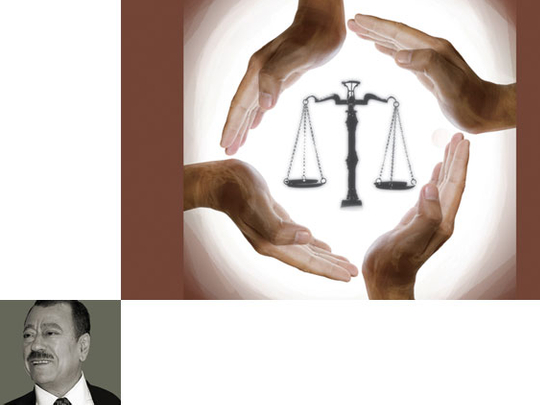
The ongoing search for a solution to the Syrian crisis, coupled with Egypt President Mohammad Mursi’s sudden and unexpected transformation from puppet to strongman, appears to be producing new political alignments and loyalties in the Middle East after half a century of stagnation.
The first hint of change came at the Organisation for Islamic Cooperation (OIC) Summit held in Makkah early last month. Saudi King Abdullah Bin Abdul Aziz greeted Iranian President Mahmoud Ahmadinejad with a bear hug while Turkey’s President Abdullah Gul and Mursi were left on the sidelines. Given that Ahmadinejad has been persona non grata in Saudi Arabia since his last visit in 2007 the warmth of this encounter was surprising.
Later, Ahmadinejad was embraced again, this time by Mursi.
King Abdullah’s opening speech emphasised the need for reconciliation between the Shiite and Sunni branches of Islam and he called for the establishment of a centre for dialogue between the Islamic doctrines. He said that sectarianism was at the heart of the current bloodshed in the region — an obvious reference to the Syrian crisis which has spilled over into Lebanon.
The king’s words reflected a widely-shared concern that the bitter sectarian violence which erupted first in Iraq, and latterly in Syria, may spread throughout the region, dragging the entire Middle East into a conflict pitting a Sunni bloc, led by Saudi Arabia and Turkey, against the Shiites of Iran, Iraq, Hezbollah and elements of the population in Syria and Lebanon. Saudi Arabia itself has a restive Shiite minority in the oil-rich east of the country.
The king’s warmth towards Ahmadinajad suggested the desire for rapprochement between the main Sunni and Shiite players.
The king may also be among those wise observers who fear the potential dismantlement of strong Arab countries along ethnic and sectarian lines. This is particularly likely in Iraq, where de facto Shiite, Sunni and Kurdish enclaves are already clearly delineated; in Libya, the people in the oil-rich eastern part of the country announced that they were now citizens of an autonomous state, Barqah, with Benghazi as its capital; and in Syria, the prospect of a mini-state for the minority Alawites on the northern part of the coastline is frequently mooted, while the Kurds now control five northern provinces.
No country in the region would be immune from a drive for dismantlement — Iran and Turkey, for example, both have ethnically diverse populations.
The break-up of once great nations would weaken collective Muslim power on the world stage and greatly benefit Israel.
A shared antipathy for Israel has already led Saudi Arabia to announce that it would shoot down Israeli warplanes entering its airspace en route to attack Iran.
It is also possible that Saudi Arabia, the land of Islam’s holiest cities, Makkah and Madinah, is seeking to reassert its position as leader of the Sunni world. Recent times have brought new challenges, first from economic superstar, Istanbul (capital of the Ottoman Caliphate), and latterly from Egypt’s Muslim Brotherhood (rooted in the great Al Azhar mosque of Cairo). Hence the sidelining of Gul and Mursi and the embracing of Ahmadinejad since no challenge for the Sunni leadership will emanate from Qom.
Meanwhile Mursi is pursuing his own entente with Ahmadinejad as the Muslim Brotherhood establishes itself as a new regional force via the political process.
The Brotherhood already has close ties with Turkey and, while Anwar Sadat and his successor, Hosni Mubarak, severed all diplomatic relations with Iran in the aftermath of the 1979 revolution, Mursi visited Tehran on Thursday and there is talk of re-opening an Egyptian Embassy there after a 33 year absence.
We should not forget that the majority of Egyptians do not reject Shiism out of hand, aware of their own cultural and religious heritage: the Shiite Fatimid Caliphate, which dominated the Arab world for most of the 10th century, had Egypt as its political, cultural and religious centre and established the city of Cairo.
Egypt is a plausible contender for the role of Iran’s new best Arab friend. Will we see a new, muscular, and potentially anti-western alignment between Egypt, Turkey and Iran?
There are implications here for Syria too. Mursi has already taken the initiative, suggesting a ‘contact group’ to broker a solution to the current crisis comprising Egypt, Turkey, Iran and Saudi Arabia. The proposal has been welcomed by Tehran.
When UN Peace envoy Kofi Annan insisted some months ago that Iran should be part of negotiations on Syria his advice was rejected by the West and its allies. Will Mursi succeed where the veteran international diplomat has failed? In his speech to the non-aligned nations in Tehran, Mursi overtly criticised the “oppressive Syrian regime”, but stopped short of advocating military intervention.
If the first signs of a thaw in relations between Riyadh and Tehran continue, might we see the Gulf states reluctantly shifting towards a political, rather than military, solution for Syria? Iran is unlikely to compromise on its support for the regime, regardless of the atrocities it has perpetrated, and has already said that it favours allowing Bashar Al Assad to serve the remainder of his presidential term, facing a ballot in 2014 which would offer him an ideal face-saving exit route.
Abdel Bari Atwan is editor of the pan-Arab newspaper Al Quds Al Arabi.










